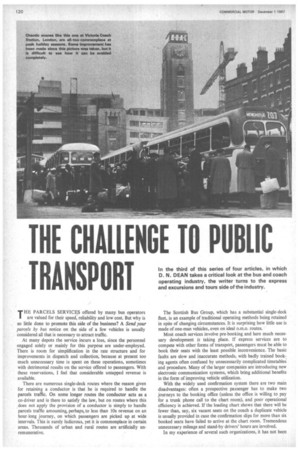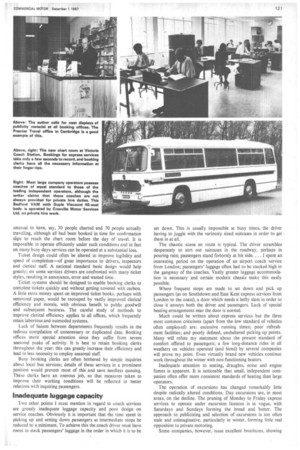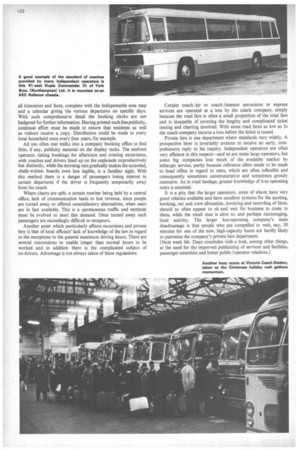THE CHALLENGE TO PUBLIC TRANSPORT
Page 122

Page 123

Page 124

If you've noticed an error in this article please click here to report it so we can fix it.
In the third of this series of four articles, in which D. N. DEAN takes a critical look at the bus and coach operating industry, the writer turns to the express and excursions and tours side of the industry.
T HE PARCELS SERVICES offered by many. bus operators I are valued for their speed, reliability and low cost. But why is so little done to promote this side of the business? A Send your parcels by bus notice on the side of a few vehicles is usually considered all that is necessary to attract traffic.
At many depots the service incurs a loss, since the personnel engaged solely or mainly for this purpose are under-employed. There is room for simplification in the rate structure and for improvements in dispatch and collection, because at present too much unnecessary time is spent on these operations, sometimes with detrimental results on the service offered to passengers. With these reservations, I feel that considerable untapped revenue is available.
There are numerous single-deck routes where the reason given for retaining a conductor is that he is required to handle the parcels traffic. On some longer routes the conductor acts as a co-driver and is there to satisfy the law, but on routes where this does not apply the provision of a conductor is simply to handle parcels traffic amounting, perhaps, to less than lOs revenue on an hour-long journey, on which passengers are picked up at wide intervals. This is surely ludicrous, yet it is commonplace in certain areas. Thousands of urban and rural routes are artificially unremunerative.
The Scottish Bus Group, which has a substantial single-deck fleet, is an example of traditional operating methods being retained in spite of changing circumstances. It is surprising how little use is made of one-man vehicles, even on ideal o.m.o. routes.
Most coach services involve pre-booking and here much necessary development is taking place. If express services are to compete with other forms of transports passengers must be able to book their seats with the least possible inconvenience. The basic faults are slow and inaccurate methods, with badly trained booking agents often confused by unnecessarily complicated timetables and procedure. Many of the larger companies are introducing new electronic communication systems, which bring additional benefits in the form of improving vehicle utilization.
With the widely used confirmation system there are two main disadvantages: often a prospective passenger has to make two journeys to the booking office (unless the office is willing to pay for a trunk phone call to the chart room), and poor operational efficiency is achieved. If the loading chart shows that there will be fewer than, say, six vacant seats on the coach a duplicate vehicle is usually provided in case the confirmation slips for more than six booked seats have failed to arrive at the chart room. Tremendous unnecessary mileage and stand-by drivers' hours are involved.
In my experience of several such organizations, it has not been unusual to have, say, 30 people charted and 70 people actually travelling, although all had been booked in time for confirmation slips to reach the chart room before the day of travel. It is impossible to operate efficiently under such conditions and in fact on many busy days services can be operated at a substantial loss.
Ticket design could often be altered to improve legibility and speed of completion—of great importance to drivers, inspectors and clerical staff. A national standard basic design would help greatly; on some services drivers are confronted with many ticket styles, resulting in annoyance, error and wasted time.
Ticket systems should be designed to enable booking clerks to complete tickets quickly and without getting covered with carbon. A little extra money spent on improved ticket books, perhaps with sensitized paper, would be recouped by vastly improved clerical efficiency and morale, with obvious benefit to public goodwill and subsequent business. The careful study of methods to improve clerical efficiency applies to all offices, which frequently retain laborious and outmoded systems.
Lack of liaison between departments frequently results in the tedious compilation of unnecessary or duplicated data. Booking offices merit special attention since they suffer from severe seasonal peaks of activity. It is best to retain booking clerks throughout the year: this can greatly increase their efficiency and lead to less necessity to employ seasonal staff.
Busy booking clerks are often bothered by simple inquiries about local bus services; details of these services in a prominent position would prevent most of this and save needless queuing. These clerks have an onerous job, so that measures taken to improve their working conditions will be reflected in better relations with inquiring passengers.
Inadequate luggage capacity
Two other points I must mention in regard to coach services are grossly inadequate luggage capacity and poor design on service coaches. Obviously it is important that the time spent in picking up and setting down passengers at intermediate stops be reduced to a minimum. To achieve this the coach driver must have room to stack passengers' luggage in the order in which it is to be set down. This is usually impossible at busy tithes, the driver having to juggle with the variously sized suitcases in order to get • them in at all.
The chaotic scene en route is typical. The driver scrambles desperately to sort out suitcases in the roadway, perhaps in pouring rain; passengers stand forlornly at his side. I spent an interesting period on the operation of an airport coach service from London; passengers' luggage often had to be stacked high in the gangway of the coaches. Vastly greater luggage accommodation is necessary and certain modern chassis make this easily possible.
Where frequent stops are made to set down and pick up passengers (as on Southdown and East Kent express services from London to the coast), a door which needs a hefty slam in order to close it annoys both the driver and passengers. Lack of special heating arrangements near the door is normal.
Much could be written about express services but the three most common criticisms (apart from the low standard of vehicles often employed) are: excessive running times; poor refreshment facilities; and poorly defined, unsheltered picking-up points. Many will refute my statement about the present standard of comfort offered to passengers; a few long-distance rides in all weathers on vehicles operated (and hired) by several companies will prove my point. Even virtually brand new vehicles continue work throughout the winter with non-functioning heaters.
Inadequate attention to seating, draughts, noise and engine fumes is apparent. It is noticeable that small, independent companies often offer more consistent standards of heating than large operators.
The operation of excursions has changed remarkably little despite radically altered conditions. Day excursions are, in most areas, on the decline. The pruning of Monday to Friday express services to operate under excursion licences is in vogue, with Saturdays and Sundays forming the bread and butter. The approach to publicizing and selection of excursions is too often stale and unimaginative, particularly in winter, forming little real opposition to private motoring.
Some companies, however, issue excellent brochures, showing all itineraries and fares, complete with the indispensable area map and a calendar giving the various departures on specific days. With such comprehensive detail the booking clerks are not badgered for further information. Having printed such fine publicity, continual effort must be made to ensure that residents as well as visitors receive a copy. Distribution could be made to every local household once every four years, for example.
All too often one walks into a company booking office to find little, if any, publicity material on the display racks. The seafront operator, taking bookings for afternoon and evening excursions, with coaches and drivers lined up on the esplanade unproductively but distinctly, while the morning rain gradually makes the scrawled, chalk-written boards even less legible, is a familiar sight. With this method there is a danger of passengers losing interest in certain departures if the driver is frequently temporarily away from his coach.
Where charts are split, a certain number being held by a central office, lack of communication leads to lost revenue, since people are turned away or offered unsatisfactory alternatives, when seats are in fact available. This is a spontaneous traffic and methods must be evolved to meet this demand. Once turned away such passengers are exceedingly difficult to recapture.
Another point which particularly affects excursions and private hire is that of local officials' lack of knowledge of the law in regard to the exceptions to the general maximum driving hours. There are several concessions to enable longer than normal hours to be worked and in addition there is the complicated subject of co-drivers. Advantage is not always taken of these regulations. Certain coach /air or coach /steamer excursions or express services are operated at a loss by the coach company, simply because the road fare is often a small proportion of the total fare and is incapable of covering the lengthy and complicated ticket issuing and charting involved. With some road fares as low as 3s the coach company incures a loss before the ticket is issued.
Private hire is one department where standards vary widely. A prospective hirer is invariably anxious to receive an early, comprehensive reply to his inquiry. Independent operators are often very efficient in this respect—and so are some large operators, but some big companies lose much of the available market by lethargic service, partly because reference often needs to be made to head office in regard to rates, which are often inflexible and consequently sometimes unremunerative and sometimes grossly excessive. As in road haulage, greater knowledge of true operating costs is essential.
It is a pity that the larger operators, some of whom have very good vehicles available and have excellent systems for the quoting, booking, car and crew allocation, invoicing and recording of hires, should so often appear to sit and wait for business to come to them, while the small man is alive to, and perhaps encouraging, local activity. The larger bus-operating company's main disadvantage is that people who are compelled to wait, say, 30 minutes for one of the new, high-capacity buses are hardly likely to patronize the company's private hire department.
[Next week Mr. Dean concludes with a look, among other things, at the need for the improved publicizing of services and facilities, passenger amenities and better public /operator relations.]




























































































































































































